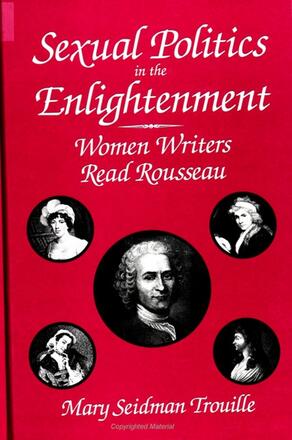
Sexual Politics in the Enlightenment
Women Writers Read Rousseau
Alternative formats available from:
Explores the way seven women writers of the eighteenth century responded to Rousseau, and traces his crucial influence on their literary careers.
Description
Sexual Politics in the Enlightenment constitutes the first book-length feminist study of Rousseau's sexual politics and the reception of his works by women readers. By today's standards, Rousseau's sexual politics appear reactionary, paternalistic, even blatantly misogynist; yet, among his female contemporaries, his works often met with enthusiastic approval and had tremendous impact on their values and behavior. To probe Rousseau's paradoxical appeal to eighteenth-century readers, Mary Trouille examines how seven women authors responded to his writings and sexual politics and traces his influence on their lives and works. The writers include six Frenchwomen (Roland, d'Epinay, Stael, Genlis, Gouges, and an anonymous woman correspondent who called herself Henriette) and the English feminist Mary Wollstonecraft.
The book constitutes an important contribution to French literature, women's studies, and eighteenth-century cultural studies. While a great deal has already been written on the individual women whom Trouille treats, what distinguishes this book is that it places multiple female subjects directly opposite Rousseau, and succeeds in showing that the relationship between mentor and student(s) is both multi-layered and fascinatingly complex.
Mary Seidman Trouille is Associate Professor of French at Illinois State University. She is translator of The Writing of Melancholy: Modes of Opposition in Early French Modernism and of Les Lieux de Memoire.
Reviews
"Other studies have discussed the sexual politics of Rousseau's writings, but this is the first book-length work to consider the influence and criticism of Rousseau's ideas specifically among his female readers. Also welcome are Trouille's discussion of the diverse reactions to Rousseau and her explanation of how historical and socio-economical forces helped condition such responses. The author does an admirable job of combining historical context analysis with close textual readings." — Julia Douthwaite, University of Notre Dame
"The author is in total command of her material: she has produced a thoroughly researched and very interesting book. By bringing under one cover the responses of seven exceptional women to one of the greatest and most controversial figures of the eighteenth century, Trouille offers insights into how and why these women—all very strong individuals in their own right—could admire a man considered by most twentieth-century feminists to be a misogynist. In so doing, she offers a straightforward and fascinating story." — Suellen Diaconoff, Colby College